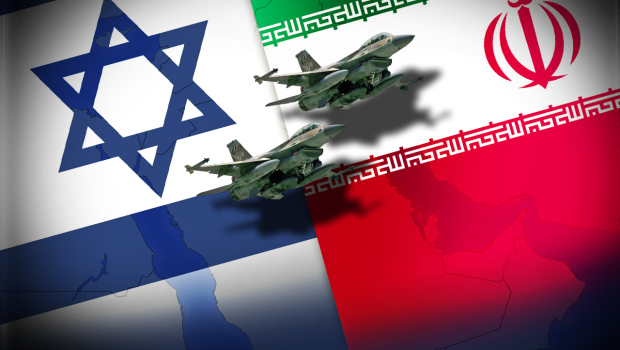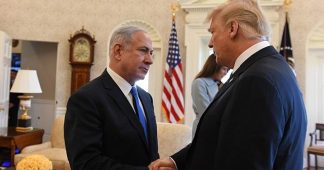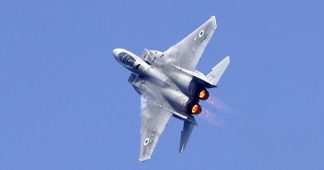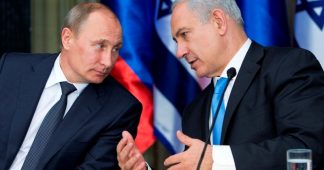“While Netanyahu keeps claiming that he has a secret understanding with Putin in regard of Israeli air strikes on Syria, the Kremlin keeps a deafening silence”
By MK Bhadrakumar
May 7, 2018
After threatening Moscow that if it went ahead with plans to strengthen Syria’s missile defence systems, Israel will destroy them on the ground – be it “S-300 or S-700”, as Israel’s Defence Minister Avigdor Liberman sarcastically put it – Tel Aviv is now seeking Russian help to calm things down. The dramatic turnaround is typical of Israel. Israel thinks it is a smart move, but will it work?
Lieberman now wants Moscow’s intervention to tamp down Israel’s tensions with Iran. Israel has painted itself into a corner. First it began taunting Iran to step up for a fight by firing missiles at locations in Syria where Iranian military advisers (IRGC personnel) could be present. In a strike on April 8, Israel drew blood, killing 7 Iranian personnel. The IRGC was not amused. Tehran vowed that Iranian retaliation is hundred percent certain but at a time, place and manner of its choice.
Whereupon, Israel began whipping up media frenzy that a war with Iran is imminent. The pro-Israeli think tanks in the US even speculated a missile war across 1500 kilometers of air space. But then, no one really believes that a war between Iran and Israel is imminent – or is even likely. Iran knows that Israel is not reckless enough to start a war – and, on the other hand, resorting to war to advance its interests (geopolitical, economic or security interests) is just not the Iranian way of doing things.
However, make no mistake, the IRGC will fulfill its pledge at some point to pay back Israel in its own coin. Israel knows it. Therefore, Liberman’s newfound conciliatory tone toward Moscow can be put in perspective.
Meanwhile, Israeli Prime Minister Benjamin Netanyahu’s attempt to raise dust on Iran’s nuclear program has crash-landed. In Europe or Russia — or within Israel itself – there are no takers for Netanyahu’s stunt. He could not produce a shred of evidence to show that Iran has an active nuclear program today and ended up highlighting, ironically, the raison d’etre of the 2015 Iran nuclear pact.
Israel’s worst fear is that President Trump too has limited choices and may negotiate with Iran eventually. (Opinion polls show that the big majority of US opinion favors Trump keeping the 2015 pact.) Trump’s record on North Korea shows that his rhetoric doesn’t reflect his policies. Besides, Israel’s clout in the Trump White House has also diminished lately. (Aaron David Miller has an interesting write-up on CNN, As Pompeo’s star rises in Trumpland, Haley and Kushner risk getting eclipsed.)
The plain truth is that Iran’s presence in Syria is a geopolitical reality that Israel has to come to terms with. Any Iranian presence in southern Syria bordering Golan Heights becomes a red line for Israel. Liberman’s attempt to rope in Russia to prevail upon Iran to stay off Golan Heights can be seen in this context.
Given the above factors at work, what could be the Russian response? At its most obvious level, Russia will not fall into another US-Israeli game plan to create dissonance in its alliance with Iran, which is acquiring a regional character today. But Russian calculus is complex. Russia’s core interest lies in accelerating a Syrian settlement. There is complete Russian-Iranian convergence in this regard.
Moscow is open to resuming discussions with Washington regarding the creation of a “de-escalation zone” in southern Syria (comprising the provinces of Daraa, Quneitra and As-Suwayda where US and Israeli backed al-Qaeda groups are in control at present). After meeting the visiting Jordanian Foreign Minister Ayman al Safadi in Sochi on Thursday, Russian Foreign Minister Sergey Lavrov said, “Today, we agreed to continue cooperation on this important issue both bilaterally and trilaterally, involving Americans and the monitoring center.”
Indeed, the key issue is the American intentions in Syria. Here, again, there is Russian-Iranian convergence on preserving Syria’s unity. But there are contradictory signals from Washington. Pentagon commanders are generally on the warpath, but there are other signals too.
The latest report that the US state department has cut off funding for the White Helmets (which Moscow alleges to be the culprit in staging the false flag operation of “chemical attacks” in Douma last month leading the US-UK-French missile strike) is a tantalizing signal.
Moscow hopes that American and French experts may join the OPCW (Organization for the Prevention of Chemical Weapons) team to conduct and independent investigation into the alleged chemical attack in Douma. If Washington and Paris cooperate with the OPCW investigation, it will be a tacit admission of their mistake in staging the April 14 missile strike on Syria.
The big question is how far Trump follows his gut instinct to withdraw forces from Syria. Meanwhile, it is highly improbable that Moscow will fall into the Israeli tantrums. President Vladimir Putin is fed up with Netanyahu’s shenanigans. Putin was reluctant to give an appointment to Netanyahu in January. While Netanyahu keeps claiming that he has a secret understanding with Putin in regard of Israeli air strikes on Syria, the Kremlin keeps a deafening silence. Paradoxically, if anyone knows the actual truth behind the Israeli claim, it is only Tehran.
Source: Indian Punchline
Published at https://russia-insider.com/en/israel-seeks-russian-help-syria-will-moscow-oblige/ri23377











